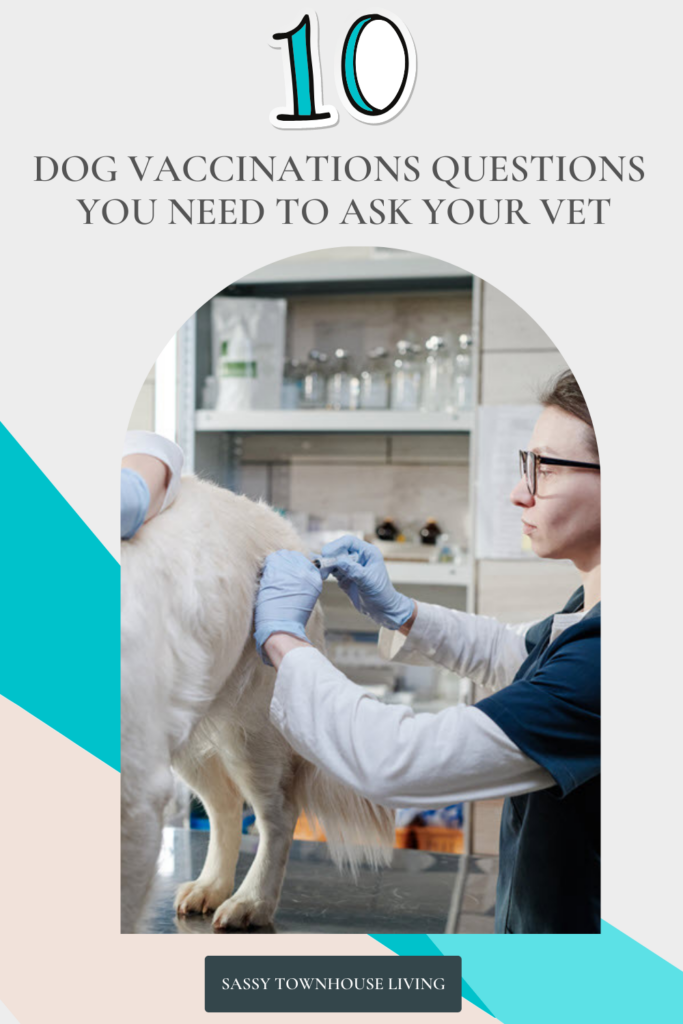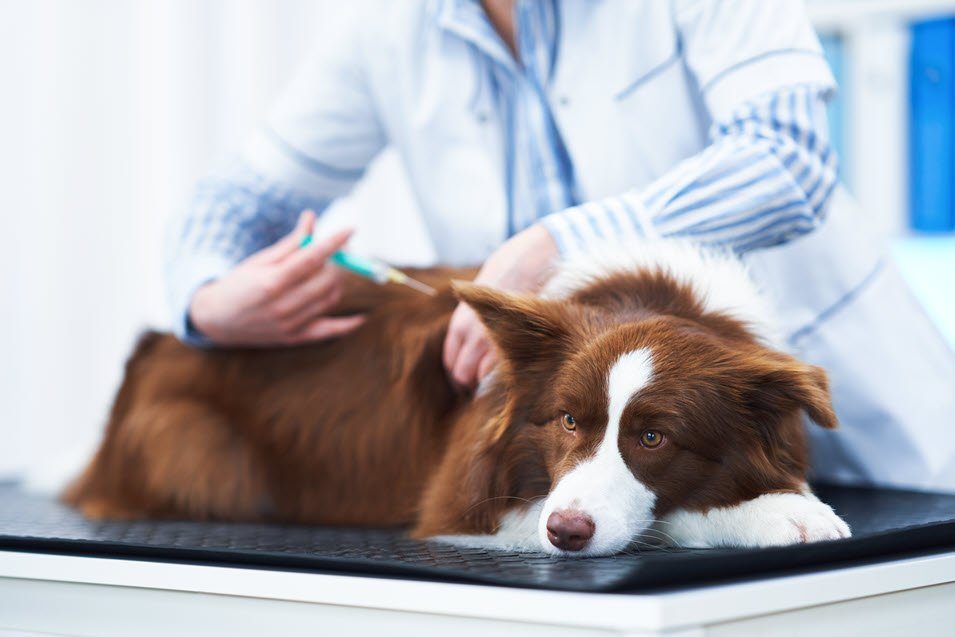With so much talk lately about vaccinations for humans, it’s no surprise that many clients have a peaked interest in dog vaccinations too. However, you might wonder which are necessary and how often.
The frequency and type of vaccinations vary based on breeding, age, and health. And the area where you live and whether your pet disease exposure also comes into play. Below you’ll discover several essential questions you can ask your vet about dog vaccination.
It’s Always A Good Idea To Ask Questions About Dog Vaccinations
It’s time for my miniature Poodle, Ollie, healthcare exam, and his vaccinations. During this time of year, it’s essential to ask your vet about dog vaccinations. And make sure you jot them down, so you don’t forget. But, remember, it’s as necessary to know about them to avoid potential problems.
As you know, dog vaccinations protect our pets against diseases that can threaten their lives. Ensuring your dog receives the necessary injection will help prevent unnecessary suffering for them and us. And hopefully help keep your dog in good health. Remember, always check with your vet to ensure you have a good understanding about vaccines and other medical issues.
Furthermore, vaccines work by exposing your dog’s immune system to these unwanted viruses and diseases. However, these vaccines don’t work right away as it takes a few weeks for their bodies to produce antibodies. However, once it does, your pet’s immune system will kick in and send antibodies to neutralize these unwanted enemies.
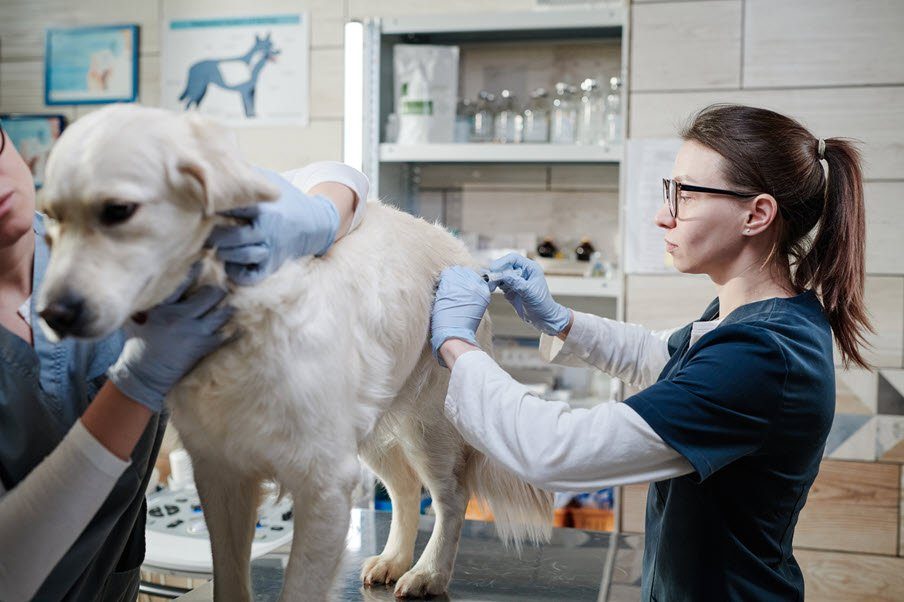
1 – When Should My Dog Get Its First Vaccinations?
Typically, vets recommend that your pet gets the first dog vaccinations at about six to eight weeks old. The most common vaccinations provided are for measles, distemper, parainfluenza, and Bordetella. However, ask your vet what the schedule should be for your situation.
2 – What Happens If They Miss A Vaccination or Booster
Of course, it’s always a good idea for your dog to stay on schedule with their vaccinations and booster. However, missing one can happen. If this occurs, make sure to schedule it as soon as possible. Always make sure you don’t miss them if your dog is a puppy. If your dog has not received their vaccine for over three years, their immune system will not protect them.
3 – How Often Should My Dog Receive Vaccinations?
You should ensure dogs receive vaccinations every three years after getting the one-year booster for a dog. The vaccinations you need may include canine parvovirus, canine adenovirus, and canine distemper virus.
If your pet is at high risk, you should speak to a veterinarian about your options. However, there might be various situations where you should have more frequent vaccinations for your pet. Again, always ask your vet.
4 – Vaccinations Frequency And Age
We mentioned the first dog vaccinations, but there are others. Vets typically give vaccines for distemper, parainfluenza, adenovirus, and parvovirus ranging from 10 to 12 weeks. However, this is along with optional vaccinations. In addition, your vet can inject Lyme disease, Bordetella, leptospirosis, and coronavirus vaccines.
Typically, your vet can administer a rabies vaccine at 12 to 24 weeks. Then, from 14 to 16 weeks, your vet can give a DHPP vaccination and several optional vaccinations depending on the dog’s needs. The options vaccinations are for Lyme disease, coronavirus, and leptospirosis.
These injections are a series. The first sensitizes the body, while the second series triggers the immune system to help prevent disease. Moreover, these will help your dog’s immunity. The second shot will cause their body to fight the substances and protect them.
The main difference is the rabies vaccine. Usually, a dog can receive one shot, which can last for years. Then you can have that vaccine given once a year or once every three years, depending on where you live.
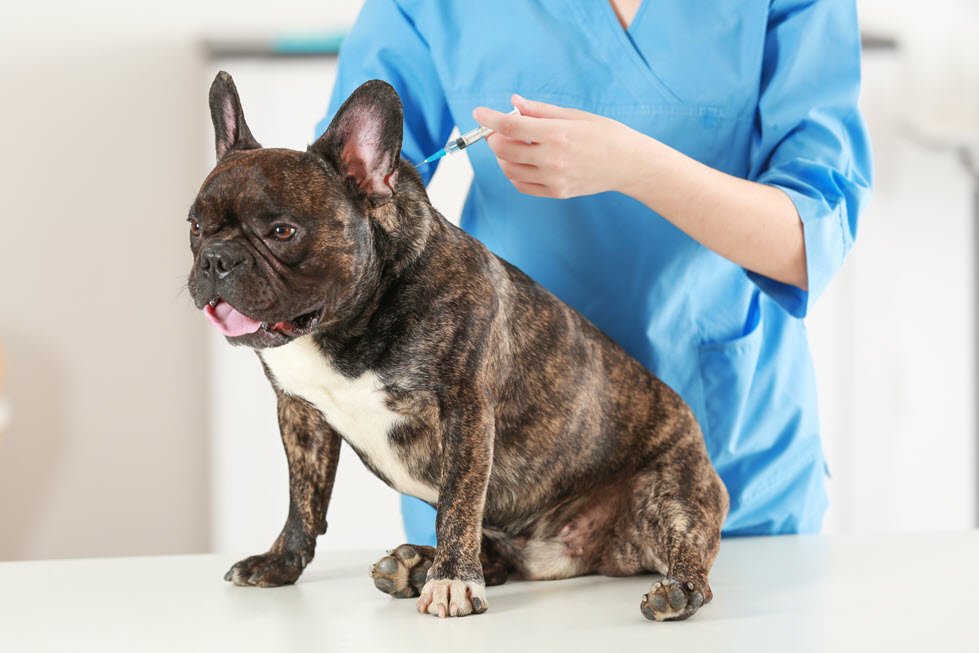
5 – What Are Core and Non-Core Dog Vaccinations?
You may have heard dog vaccinations called core or non-core. A core vaccine is typically for rabies, canine hepatitis, distemper, and parvovirus. These are the vaccinations that all dogs should receive regularly.
Core vaccines are vital for all dogs because of the severity of the potential disease. Or the likelihood of disease transmission to humans or other pets. When it comes to non-core vaccinations, these aren’t mandatory.
However, it’s always better to receive extra vaccinations to ensure the dog is safe. You can choose non-core vaccinations based on the exposure risk of the dog.
6 – Should I Worry About The Non-Core Vaccinations?
Think about it this way. Do you want your dog to become sick? Non-core vaccines are like an insurance policy for your pet’s health and wellness. If you want to avoid your pet exposure to diseases, you should ensure they have all the appropriate non-core vaccinations.
However, the right non-core vaccines for your dog’s needs might vary. Where you live, how old the dog is, and what health issues will come into play. Make sure to speak to a medical professional who can give you insight into your best options.
7 – Can My Dog Be Around Other Pets Before Full Vaccination?
If both dogs are in good health, it might be okay to have them exposed to other pets. However, there will always be a risk until the dog vaccinations are complete. And you wait at least a couple of weeks for the vaccines to kick in and start working.
Vaccines cause the immune system to build defenses. However, it often takes at least two shots to become complete immunity. Therefore, it’s safest to have several dogs playing together only after completing a vaccine series. If you have the dog around other pets, ensure the other animals receive their vaccinations. Above all, stick to safe environments where you feel comfortable.
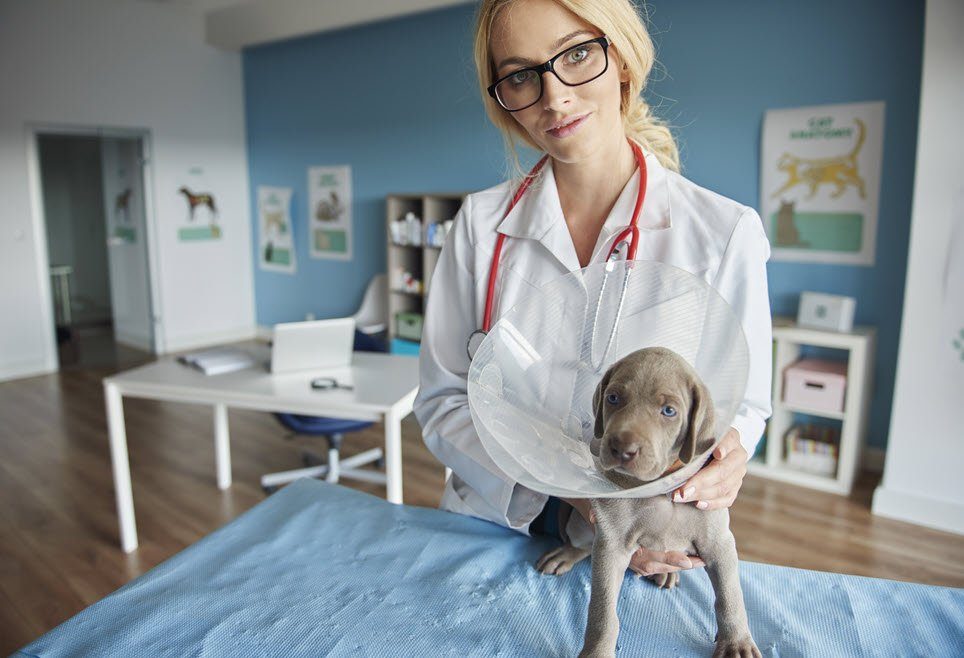
8 – Should My Dog Receive Vaccines With A Chronic Illness Or Medical Condition?
This question is hard to answer, so you should ask your veterinarian for insight. Of course, it depends on your pet and what conditions it has. If your vet hasn’t already indicated that you should avoid vaccinations, take your dog in but let them know the dog is ill. And, of course, share the symptoms in detail with your vet.
9 – What Are Signs Of A Bad Reaction To Dog Vaccinations?
Like humans can have mild side effects to a vaccine, the same can occur with dog vaccinations. In most cases, these will not be serious. A lot of these side effects will diminish in under 48 hours. Some of the most common side effects include:
- Diminished appetite
- Discomfort
- Lower activity levels
- Mild fever
- Minor coughing
- Sneezing
- Swelling at the vaccination site
Of course, if your dog experiences any of these symptoms, bring them to the vet right away.
10 – What Vaccine Side Effects Require Veterinary Intervention?
On the other hand, some side effects require the help of a veterinarian. Therefore, it’s essential to know which symptoms are problematic so you can contact a professional if your pet is experiencing these issues. These include:
- Collapse
- Continual diarrhea
- Constant vomiting
- Itchy skin with bumps
- Swelling of the eyes, face, neck, and muzzle
- Serious coughing
- Trouble breathing
We hope this answers some of the questions you have about dog vaccinations. If you have more, make sure you speak to a professional who has experience. It’s always a good idea to keep yourself informed about your pet’s health. And make sure you ask the right questions for your vet to stay informed.

How To Get Faster Payments As A Small Business
Every small business wants to have its invoices paid faster. Especially to have enough funds to cover expenses and have a safety net.
Learn More
Don’t Forget To Pin Your Inspiration
